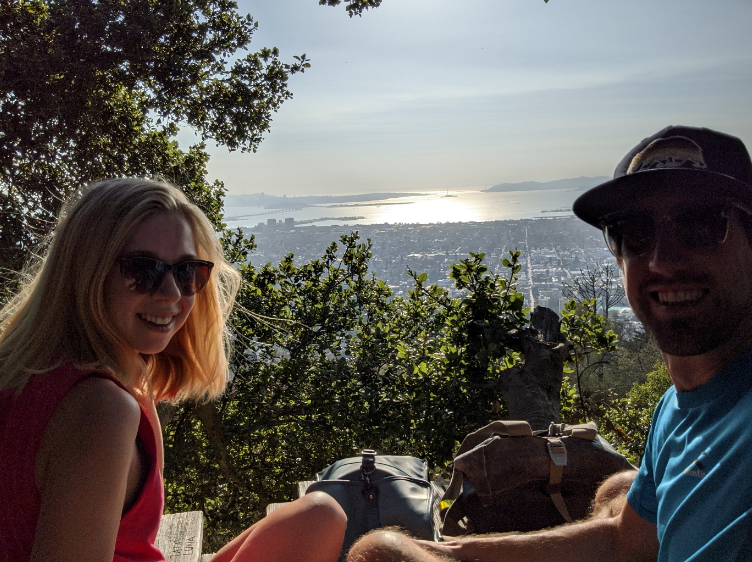During the first COVID lock-down in my hometown Vienna, Austria, writing a Fulbright proposal for visiting the United States felt strange. My partner and I did not even dare to celebrate when we received the request to sign the contract and submit our documents for the visa procedure. When we finally touched ground in California, we could not believe our luck. We could finally taste the life we only knew from the movies, music and, in general, our pop-cultural upbringing. Until our departure, I never stopped marvelling at this alien world, beautiful and seemingly endless landscapes, diversity in biomes and cultures, buzzing urban areas, but also its enormous divide between rich and poor, ubiquitous slums and the currently prevailing grand polarization of the American population.
The primary aim of my visiting scholar stay at the Lawrence Berkeley National Laboratory (LBNL) was to prepare the grounds to establish a research programme in my home institution. However, what I got out of my Fulbright experience was so much more. As a postdoc in Vienna and Rome, taking time and distance from project deliverables and daily requests was always tricky. After an initial, not recommendable phase of trying to reconcile both, meetings in the EU and research in the US, the ten-hour time-zone difference became a blessing. For the first time, I could sketch out a coherent research strategy while constantly discussing its core concept and aspects with the brightest minds I had ever met.
Even though I was visiting the LBNL, we mostly spent our days on the gorgeous campus of UC Berkeley. We were intensively co-working, to be precise, on the Free Speech Movement café terrace or after sunset in the library in the big armchairs between the mural paintings. Thanks to the Californian weather, holy eduram.org, matcha lattes, K95-masks and noise-cancelling headphones, I found myself in a working environment perfectly balancing productivity and COVID-safeness with an uplifting bay view, exciting distractions and beautiful friends and colleagues. Also, the postdoc associations took excellent care of us. In my first week and during a picnic organized by the associations, I received two things that made me happy; the first was a simple water bottle from the LBNL with a plain print reading “Postdocs appreciation week 2021”. With Silicon Valley just across the bay, a salary many times higher than in academia is always just around the corner. But not only the money is attractive, it’s also the many insights you get daily into the machinery driving and the dynamics of the most pressing technological innovations that might govern our lives in the decades to come. But more than that, was I excited about the diversity of great minds primarily motivated by the gain of knowledge that UC Berkeley, LBNL and other scientific institutions attract to the east suburbs of San Francisco. I am convinced that the feeling of appreciation, sometimes only expressed by a simple water bottle, contributes a fair share to this attraction.
During the same picnic, we also met our new postdoc friends, with whom we spent most of our time in California. Our core, dynamically expanding circle included fellow North Americans and scientists from South America, Europe, India and Asia. Together, we co-worked and helped each other navigate through the challenges and beauty of daily life. Thursdays, we met on campus to dance Cuban salsa and continued until late at night in a cocktail bar around the corner. On the weekends, we rented cars and drove to Pacifica beach to surf, explore the best hikes north and east of Berkeley, mount bikes to explore the bay bike trail, go windsurfing, BBQ, or perform concerts and celebrate in the marina. Together, we discovered algorithm raves and the most beautiful neighbourhoods in SF, flew off to Kauai, Las Vegas, Grand Canyon, or spent time cooking and dancing in a hut in the national parks. However, besides these marvelling activities and sites, the emotional intensity of the relationships in this unique constellation of friends struck me most. The general openness for, and even more the cordial interest in all facets of each other’s personalities and perspectives helped me to come out of my shell and to love more the people around me, my partner and myself.
Meanwhile, back in Vienna, those memories feel like an almost forgotten dream. When we finally return to Berkeley, we will find that most friends and colleagues have moved on or back to their home countries. Hardly anyone of us came to settle in California for good. But the bonds and memories with our new friends and collaborators will stay, as does the realization best summarized with Pantha rhei – everything flows; it was not despite but because of our visibly limited time together that we fully lived and enjoyed the moment. I wish everyone the opportunity to change residence for a while and experience one’s life from another perspective.
Thank you, Fulbright.
Dr. Fabian Schipfer is an Austrian 2021-2022 Fulbright Schuman Research Scholar in Energy to the Lawrence Berkeley National Laboratory. Fabian Schipfer works in the interdisciplinary field of systems engineering at the Technische Universität Wien, Austria. His research focuses on coupling renewable electricity sectors with the sustainable provision of food, materials and energy services from the biosphere. His Fulbright visiting scholar stay was hosted by Hanna Breunig, deputy of the Sustainable Energy and Environmental Systems Department at the Lawrence Berkeley National Laboratory. A collaborative scientific publication on how to simultaneously improve the reliability and efficiency of the economic metabolism through sector coupling is forthcoming and will be summarised and advertised under the following link; www.schipfer.eu.
Articles are written by Fulbright grantees and do not reflect the opinions of the Fulbright Commission, the grantees’ host institutions, or the U.S. Department of State.


